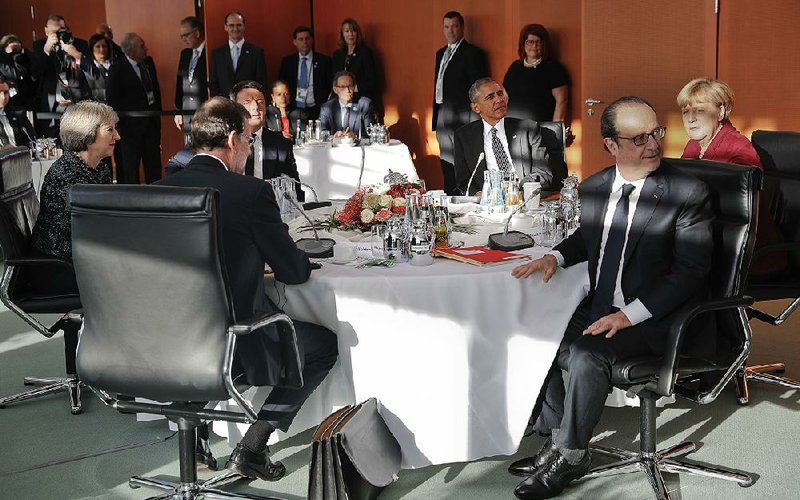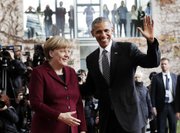BERLIN -- President Barack Obama and several European leaders "unanimously agreed" Friday to keep sanctions in place against Russia for its intervention in Ukraine, over concern that President-elect Donald Trump might soften the United States' stance against Moscow.
The show of solidarity came as U.S. allies -- and Ukrainians -- have been unsettled by uncertainty regarding the kind of foreign policy Trump will pursue.
With surging populist movements straining alliances and Trump's election upending the political calculations of many countries, fighting in Ukraine has made the country vulnerable to the shifting political winds.
The fighting has continued since Moscow fomented an uprising among ethnic Russians in eastern Ukraine with the help of undercover Russian forces and then annexed Crimea in March 2014.
As a candidate and as president-elect, Trump has frequently expressed admiration for President Vladimir Putin of Russia, and a former Trump campaign manager, Paul Manafort, previously worked for a former Ukrainian president, Viktor Yanukovych, who is now exiled in Russia.
Meeting in Berlin, Obama and the European leaders agreed that the sanctions should stay until Moscow upholds its pledge for a cease-fire and withdraws heavy weapons from front lines in eastern Ukraine, according to the White House.
Those in attendance Friday included the German chancellor, Angela Merkel, and the French president, Francois Hollande, as well as the prime ministers of Britain, Italy and Spain.
The agreement on Ukraine came after remarks Thursday by Obama warning Trump to "stand up" to Moscow when it violated international agreements.
Merkel also reminded Russia that peace in Europe had been possible over the past several years only because all nations respected the boundaries drawn up after World War II.
Mariano Rajoy, Spain's prime minister, in a news conference after the meeting called thriving populism one of the most important issues confronting the European Union, acknowledging that 2017 would be a difficult election year, with nationalist forces vying for power in France, Germany and the Netherlands.
Merkel, commenting on her growing influence in the EU and globally, said, "One person alone can never solve everything, we're only strong together... . I will do what is my duty as the German chancellor, namely on the one hand to serve the people in Germany, but that includes for me to work for European unity and European success."
Friday's meeting concluded a weeklong visit to European allies by Obama, whose term ends in January.
But what was supposed to be a valedictory lap turned into an exercise in calming anxieties about the future of trans-Atlantic relations spurred by the victory of Trump, who repeatedly called the NATO alliance into question during his campaign.
The U.S. election result last week, coming on the heels of the British vote in June to leave the European Union, intensified an existential crisis for the bloc.
The leaders also discussed tensions in the Middle East, including the situation in Syria, the White House said. They agreed that attacks on the besieged city of Aleppo should be halted immediately, and they called on Russia and Iran to halt their support for the Syrian government of Bashar Assad.
"On Syria, of course looking at Aleppo, we were united in our condemnation of the atrocities that are taking place there," May told reporters, standing alongside Merkel after Obama had departed. "We agreed the need to keep up pressure on Russia, including the possibility of sanctions on those who breach international humanitarian law."
That consensus, too, was another potential point of departure from Trump, who has signaled that he may side with Russia in backing the Assad government against the opponents trying to unseat it, including the Islamic State group.
Also on the agenda was the Iraqi-led battles to recapture the northern city of Mosul from Islamic State militants.
"The president emphasized that de-escalation and a diplomatic solution to the ongoing conflict are the only viable ways to end the suffering, prevent another migration crisis," the White House said in a statement.
After the meeting in Berlin, Obama left Germany for Latin America on the next leg of his farewell tour.
presidential tips
Not only has Obama increasingly had to explain Trump's intentions on the global stage, but he also has had to, in the U.S., assist in coaching the incoming president on the inner workings of the nation's top job.
While Trump has spent the past few days holed up in his skyscraper, Obama has given Trump policy advice, style tips and gentle nudges to let the fervor of the campaign give way to the sobriety of the Oval Office.
Standing next to Merkel in Berlin, Obama said Trump would see quickly that a president's responsibilities can't be treated casually and that a diverse country can be governed only by "listening and reaching out."
"It is my hope that that is what will happen," Obama said. "And I'm going to do everything I can over the next two months to help assure that that happens."
Though the outgoing president made clear his disdain for Trump throughout the campaign, Obama has been helping to get him up to speed in a matter of weeks.
It's unclear how much help Trump wants or will accept from Obama. And no one expects that the executive tutoring will change substantially Trump's vast differences with Obama, whom Trump called the worst president in U.S. history.
Aides said that after meeting with Trump, Obama resolved to spend more time helping prepare Trump than he might have if, for example, Hillary Clinton had been elected, aides said.
Trump, to the surprise of many, embraced the opportunity to meet with Obama. He said afterward that he wanted Obama's "counsel" and looked forward to "many, many" more meetings.
In the run-up to the election, the White House planned only perfunctory, refresher-style briefings for Clinton, who is no stranger to the White House and whose transition team had prepared extensively for an expected takeover.
Soon after Trump's victory, White House chief of staff Denis McDonough directed that his preparatory materials be thickened and his intelligence briefings expanded to include more basic information, according to U.S. officials, who weren't authorized to discuss the matter publicly and requested anonymity.
Obama and his closest advisers were irritated when it was leaked that Trump, during his White House visit, had displayed a lack of thorough knowledge about key issues while Trump's aides appeared unfamiliar with the process of staffing a White House, officials said.
They were concerned that if Trump felt insulted or aggrieved, he might pull the plug on accepting Obama's advice and help. After all, Obama's aides had been pleasantly surprised when Trump, after their Oval Office chat, had agreed to preserve key elements of the Patient Protection and Affordable Care Act, which he'd pledged during the campaign to repeal.
Trump's team has shown appreciation for the help.
Asked why Trump's meeting this week with Japanese Prime Minister Shinzo Abe was closed to the press, senior transition adviser Kellyanne Conway pointed out that Obama was traveling overseas.
"We are very deferential and respectful of the fact that we already have a president of the United States, Barack Obama," Conway told reporters. "President Obama is still in office for the next two months, and we won't be making diplomatic agreements today."
Information for this article was contributed by Melissa Eddy and Gardiner Harris of The New York Times; by Josh Lederman of The Associated Press; and by Anthony Faiola of The Washington Post.
A Section on 11/19/2016

